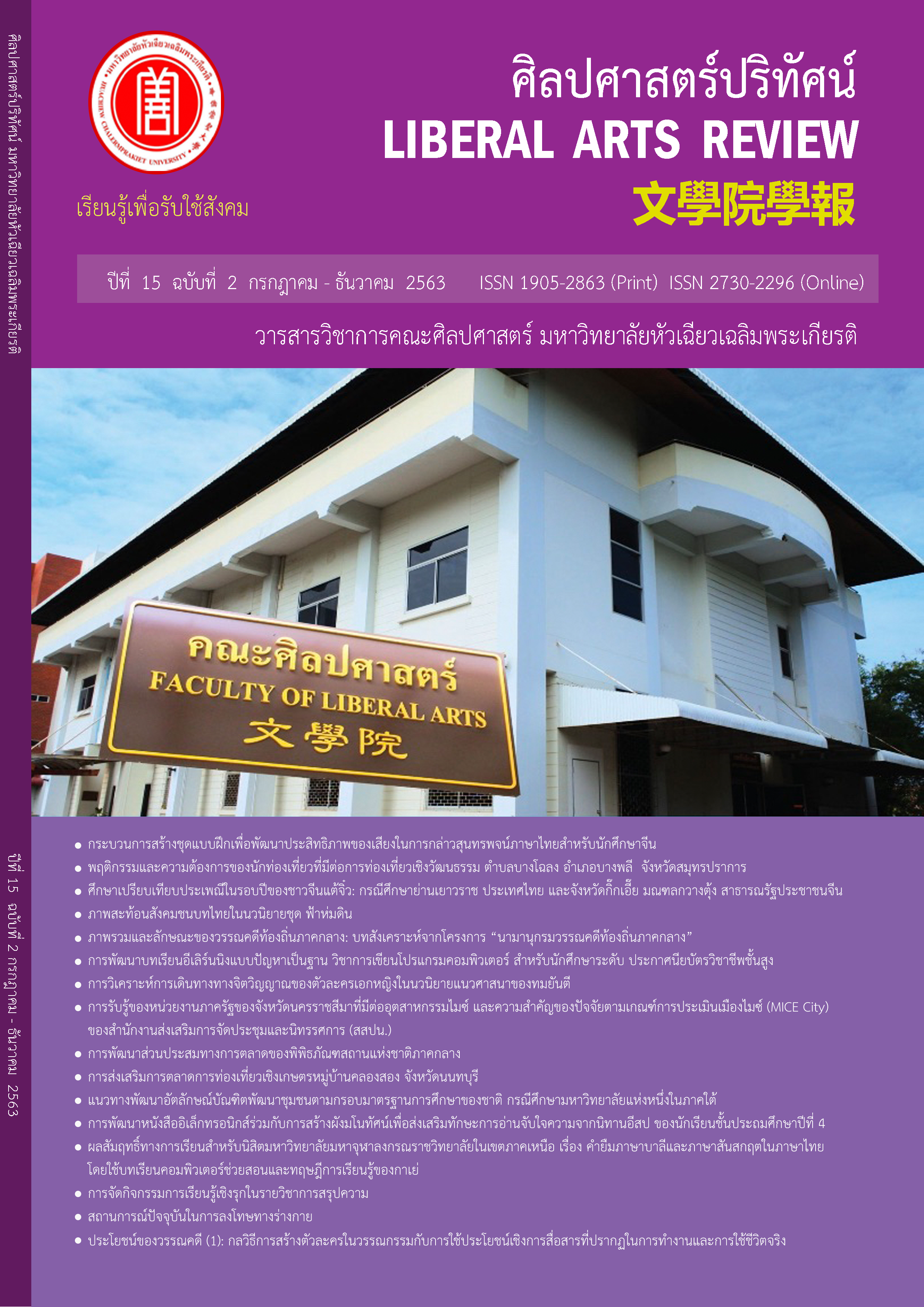การพัฒนา หนังสืออิเล็กทรอนิกส์ร่วมกับการสร้างผังมโนทัศน์เพื่อส่งเสริมทักษะ การอ่านจับใจความจากนิทานอีสป ของนักเรียนชั้นประถมศึกษาปีที่ 4
คำสำคัญ:
หนังสืออิเล็กทรอนิกส์, การอ่านจับใจความ, ผังมโนทัศน์, นิทานอีสปบทคัดย่อ
การวิจัยนี้มีวัตถุประสงค์เพื่อ 1) สร้างหนังสืออิเล็กทรอนิกส์ร่วมกับการสร้างแผนผังมโนทัศน์ เพื่อส่งเสริมทักษะการอ่านจับใจความจากนิทานอีสป 2) ศึกษาทักษะในการอ่านจับใจความของนักเรียนชั้นประถมศึกษาปีที่ 4 3) ศึกษาความพึงพอใจของนักเรียนที่มีต่อหนังสืออิเล็กทรอนิกส์ร่วมกับการใช้ผังมโนทัศน์เพื่อส่งเสริมการอ่านจับใจความจากนิทานอีสป กลุ่มตัวอย่าง ได้แก่ นักเรียนชั้นประถมศึกษาปีที่ 4 กลุ่มโรงเรียนไร่อ้อยดารา จำนวน 30 คน ได้มาด้วยการเลือกแบบเจาะจง เครื่องมือวิจัย ได้แก่ หนังสืออิเล็กทรอนิกส์นิทานอีสป แบบทดสอบก่อนเรียนและหลังเรียน และแบบสอบถามความพึงพอใจ สถิติที่ใช้ในการวิจัย ได้แก่ ค่าร้อยละ ค่าเฉลี่ยและส่วนเบี่ยงเบนมาตรฐาน ผลการวิจัย พบว่า 1) หนังสืออิเล็กทรอนิกส์นิทานอีสปทั้ง 5 เรื่อง ได้แก่ คนเลี้ยงแพะ ลาขี้โมโห พังพอนกับหนูนา ชายหนุ่มกับต้นไผ่ และสิงโตกับ เสือโคร่ง มีคุณภาพในภาพรวมทุกด้านอยู่ในระดับมาก ( = 4.07, S.D. = 0.48) 2) ความสามารถใน การอ่านจับใจความด้วยการสร้างผังมโนทัศน์ มีค่าเฉลี่ย 82.22 เป็นไปตามเกณฑ์ร้อยละ 80 และ ความสามารถในการอ่านจับใจความด้วยการเล่านิทาน มีค่าเฉลี่ย 80.50 เป็นไปตามเกณฑ์ร้อยละ 80 และ 3) ความพึงพอใจของนักเรียนชั้นประถมศึกษาปีที่ 4 กลุ่มโรงเรียนไร่อ้อยดารา จังหวัดอุตรดิตถ์ที่มีต่อการใช้หนังสืออิเล็กทรอนิกส์นิทานอีสปในภาพรวมอยู่ในระดับมาก (
= 4.08, S.D. = 0.20)
เอกสารอ้างอิง
ครรชิต มาลัยวงศ์. (2540). นวัตกรรมทางเทคโนโลยีในทศวรรษ 2000. กรุงเทพมหานคร: ซีเอ็ดยูเคชั่น.
งานวิเทศสัมพันธ์ กองนโยบายและแผน. (2558). ระบบการศึกษาในประเทศอาเซียน. กรุงเทพมหานคร: มหาวิทยาลัยเทคโนโลยีราชมงคลสุวรรณภูมิ.
ฉวีวรรณ คูหาภินันทน์. (2542). การอ่านและการส่งเสริมการอ่าน. กรุงเทพมหานคร: ศิลปาบรรณาคาร.
ถนอมพร เลาหจรัสแสง. (2550). การบูรณาการเทคโนโลยี e-Learning ประเภทเกมในชั้นเรียน. การประชุมทางวิชาการของมหาวิทยาลัยเกษตรศาสตร์ ครั้งที่ 45, สาขาศึกษาศาสตร์ สาขาเศรษฐศาสตร์และบริหารธุรกิจ สาขามนุษยศาสตร์และสังคมศาสตร์.
ทิศนา แขมมณี. (2530). การทดลองใช้รูปแบบการฝึกทักษะการทำงานกลุ่ม สำหรับนักเรียนระดับประถมศึกษา : รายงานวิจัย. กรุงเทพมหานคร: กองวิชาการ สำนักงานคณะกรรมการการประถมศึกษาแห่งชาติ.
นิภาภรณ์ พรรณศรี. (2546). ผลการเรียนรู้ของนักเรียนชั้นประถมศึกษาปีที่ 6 เรื่องพลังงานและสารเคมีเมื่อใช้กิจกรรมการเรียนการสอนตามโมเดลการเรียนรู้แบบคอนสตรัคติวิสต์. (วิทยานิพนธ์ศึกษาศาสตรมหาบัณฑิต).มหาวิทยาลัยขอนแก่น, ขอนแก่น.
รดา วัฒนะนิรันดร์. (2558). ผลการจัดกิจกรรมการเรียนรู้ด้วยเทคนิคการเรียนรู้แบบ TGT โดยใช้บทเรียนคอมพิวเตอร์ช่วยสอนเพื่อพัฒนาการอ่าน เขียน คำอักษรนำ สำหรับชั้นประถมศึกษาปีที่ 3. (วิทยานิพนธ์ครุศาสตรมหาบัณฑิต).มหาวิทยาลัยราชภัฏเชียงราย, เชียงราย.
อมรรัตน์ ยางนอก. (2549). การพัฒนาหนังสืออิเล็กทรอนิกส์ เรื่อง การใช้ภาษาอังกฤษเพื่อการสื่อสาร. กรุงเทพมหานคร: มหาวิทยาลัยเกษตรศาสตร์
ออนมา ออง และ กอบสุข คงมนัส. (2561). การพัฒนาหนังสืออิเล็กทรอนิกส์ เรื่อง พยัญชนะและสระภาษาไทย สำหรับนักศึกษาเมียนมา ระดับปริญญาตรีสาขาวิชาภาษาไทย มหาวิทยาลัยภาษาต่างประเทศย่างกุ้ง สาธารณรัฐแห่งสหภาพเมียนมา. วารสารศึกษาศาสตร์ มหาวิทยาลัยนเรศวร, 20(4), 266-278.
อุไรวรรณ สอิ้งทอง. (2555). การจัดกิจกรรมเสริมหลักสูตรตามทฤษฎีอภิปัญญาเพื่อพัฒนาการอ่านจับใจความภาษาอังกฤษของนักเรียนชั้นประถมศึกษา โรงเรียนบ้านคลอง 14 อำเภอองครักษ์ จังหวัดนครนายก. นครนายก: มหาวิทยาลัยเทคโนโลยีราชมงคลธัญบุรี.
Barker, Philip. (1992). Electronic books and libraries of the future. The Electronic Library, 10(3), 139-149.
ดาวน์โหลด
เผยแพร่แล้ว
รูปแบบการอ้างอิง
ฉบับ
ประเภทบทความ
สัญญาอนุญาต
บทความที่ได้รับการตีพิมพ์เป็นลิขสิทธิ์ของวารสารศิลปศาสตร์ปริทัศน์
ข้อความที่ปรากฏในบทความแต่ละเรื่องในวารสารวิชาการเล่มนี้เป็นความคิดเห็นส่วนตัวของผู้เขียนแต่ละท่านไม่เกี่ยวข้องกับมหาวิทยาลัยหัวเฉียวเฉลิมพระเกียรติ และคณาจารย์ท่านอื่นๆในมหาวิทยาลัยฯ แต่อย่างใด ความรับผิดชอบองค์ประกอบทั้งหมดของบทความแต่ละเรื่องเป็นของผู้เขียนแต่ละท่าน หากมีความผิดพลาดใดๆ ผู้เขียนแต่ละท่านจะรับผิดชอบบทความของตนเองแต่ผู้เดียว




